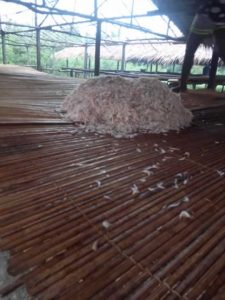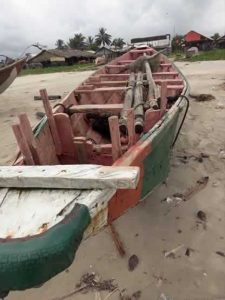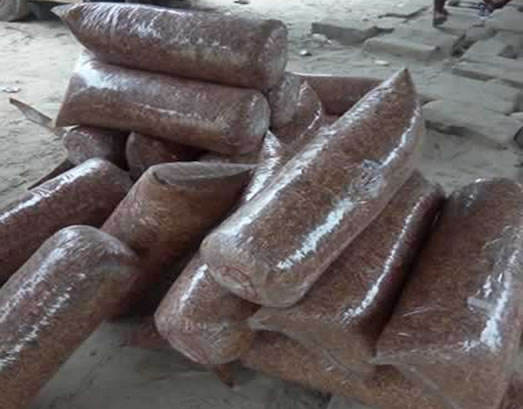Crayfish business is a flourishing one, but a tough job to do- from sourcing to taking the finished product to consumers. From fishing in the high seas to the time they are used as seasoning, it takes precious man-hours and energy. Men, women and children are major players in this business. And there is no is dull moment in preparing them for sale. Yet, the effort handsomely pays off as the people doing the business declared “It is rewarding in this period of economic recession in the country.”
StraightNews undertook a trip to Mkpanak village in Ibeno Local Government Area of Akwa Ibom State, one of the depots where crayfish are sourced, smoked and shipped to other parts of the country. In Mkpanak village close to the abandoned jetty of Mobil Producing Nigeria Unlimited is Qua Iboe River, a tributary emptying into Atlantic Ocean. Engine boat operators were seen bringing fishermen from the ocean through the river to berth at the shore.
Not long, a steam boat operator arrived at the shore. He berthed and anchored his boat. Two fishermen strolled out from the boat. StraightNews accosted one of them, Etim Enyina who narrated his experience thus “I am just coming from the ocean. We use net to catch crayfish. After catching them, you bring for sale to our customers who are mainly women. A small basin costs N5,000.”
Another fisherman who wanted to remain anonymous said “We bought nets and gave to people to weave for us. A boat you are seeing here costs N1 million while and an engine depending on the horsepower costs from N 1 million. It is expensive to maintain a boat, though within a short time, we usually recoup our expenses. Our problem is with Cameroun Gendarmes. We source crayfish from the high seas. In venturing in the business, they could arrest and detain you. It is not easy because Nigerian government may not come to your rescue.”

Close to the jetty are large crayfish smokehouses run by men and women from different ethnic nationalities in Nigeria. Expansive but elaborately divided to accommodate all the users. Bunches of firewood are scattered over the arena. More than 300 make-shift racks of smoker are raised. The traditional method of smoking involves suspending the crayfish on racks in the smokehouses. Smouldering at the bottom are bunches of hardwood chips spread over the place. These woods are shipped from the neighbouring forest in the locality. At 5 p.m. the arena suddenly turned to one huge fire spots such that it became difficult to see another in the nearby smokehouse. Clatter of sounds rent the air.
By this time, Miss Justina Festus from Aiyetoro in Ondo State was spreading fresh crayfish on the racks of smoking compartments. Flaming fire seeped out soot and started raging ferociously. A motor cyclist landed with three basins containing crayfish, which are small arthropods resembling mini lobsters. They are edible crustaceans eaten all over the world.
Miss Festus ordered her maid to bring the basins. She was sitting on top of the racks and spreading on the smoker. “It takes five or six hours for me to dry them properly and return to the owner,” she narrated.
The crayfish smoker said “I charge N200 a basin to dry for anybody. At times, I dey make more than N20,000 a month from this business. I dey send money to parents at home. I dey use this money to send my siblings to school.”
Stoutly built Felicia Omawumi was busy stoking fire. She climbed the racked smoker and spread crayfish on top of it. “I dey come from Osun State. I do this for a living. I dey make money small, small. Half bread is better than none. In a day, I dey get up to N1,500. I dey smoke my own overnight. In the morning, I go come comot the crayfish, pack dem into bags and hand over to the owners. After, dem go pay me.”
The sprawling smoke houses are located at an unhygienic area abutting a swamp. Muddy and malodourous, the area daily plays host to many customers thronging the place to buy bags of smoked crayfish. Ekaete Udoh from Essien Itiaba in Nsit Atai Local Government Area was excited working there. “I thank God every day, I dey make money. I dey make N10,000 every month. I use the money to take care of myself and my family.”

To Etim Udobia from Esit Eket Local Government Area, “crayfish business helps me a lot in taking care of my family. I do not own a smokehouse, but I pay some of these women to dry the crayfish for me. At the end of the day, I pay them per basin, pick my product and dispose such to customers.”
Emmanuel Essien, an indigene of Mkpanak who guided the StraightNews team round the area, took the reporters to one of the evacuation depots in the area. Close to the jetty were buyers packing bags of crayfish for shipment. Loaders were seen packing bags of crayfish into vehicles labelled “Imo Transport Service.” Mrs. Chinyere Sunday told StraightNews “A bag of this crayfish is sold N10,000 to us. We are carrying these bags to Imo and other South Eastern States of the country. We also supply them to Abuja and Lagos and other parts of the country.”
“At times, we make profit depending on the amount of capital you put in. Like any other business, we lose too depending on the economic realities of the country,” she stated.
The name crayfish comes from French word escrevisee. Crayfish can live up to two to three years, but with proper treatment could live up to 7-8 years. It is made up of 20 body segments grouped as cephalothorax and the abdomen. It grows up to 17.5 centimetres (6.9 inches) in length. Crayfish are fresh water crustaceans.

